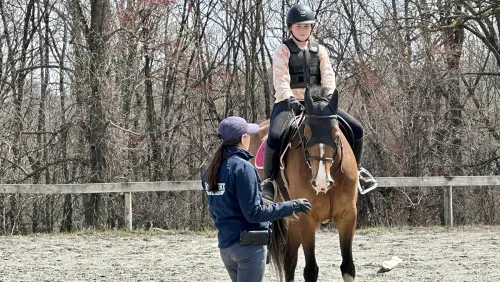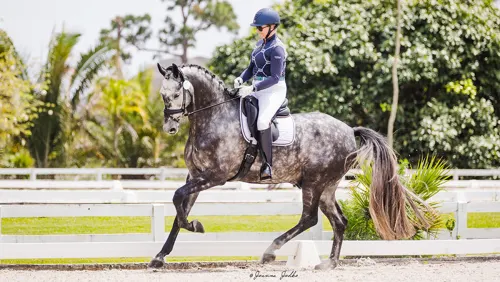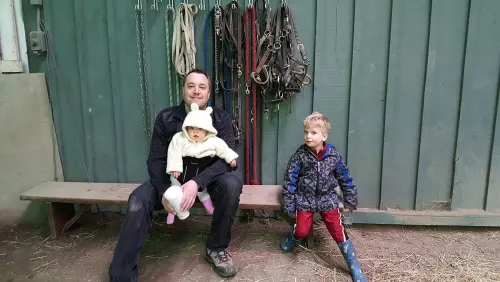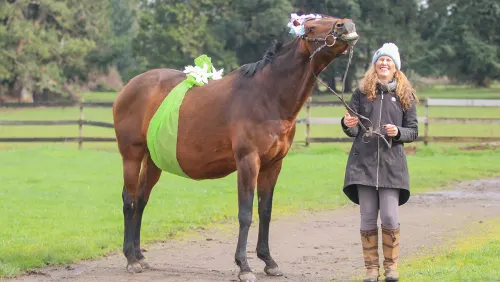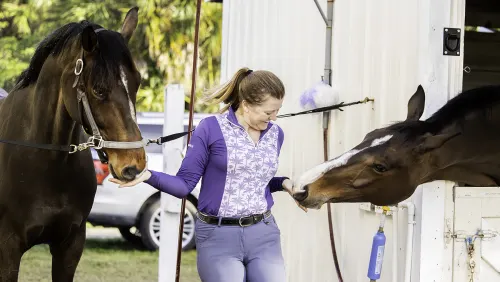I was home in Kentucky this weekend for my sister’s baby shower. Twenty women together, celebrating the birth of another female (yes, I’m going to have a little niece!). As I gazed around the room, which was decorated appropriately in pink, pink, pink, I thought about what kind of world my niece will be living in. She will be free to do as she pleases and nurtured by my sister and my family to be exactly who she wants to be.
Because my thought process is constantly linking seemingly unrelated topics together, I then thought about a recent interview I did for our digital publication the Chronicle Connection. I spoke with up-and-coming show jump rider, Dalma Malhas, a 19-year-old Saudi Arabian woman who was the first female to represent her country in any sort of Olympic Games. And she won the bronze medal to boot at the Singapore Youth Olympic Games in 2010.
The more I learned about Malhas, the more obvious it became just how influential her mother’s support was in helping her get to where she is today. Speaking with her mother, Arwa Mutabagani, was enjoyable and inspiring. I was lucky to be able to tell her daughter’s story, and, as a result, I feel strongly about sharing Mutabagani’s tale as well, because it, just like Malhas’, is changing a nation.
Born to a “dominating” Saudi Arabian father and an Italian mother, Mutabagani was raised Muslim.
“We were moderate Muslims. My mother brought me up in a way that I would respect the tradition and the culture,” said Mutabagani. “I was brought up traditionally, like Saudi Arabian girls at that time.”
Although Mutabagani says that Saudi Arabian culture is changing “slowly, slowly” in women’s favor, much of what girls and women can do in public is still limited. Among other restraints, women must wear abayas to cover their clothes, males (preferably a family member) must accompany them when outside the house, and they cannot drive. Additionally, girls and women are strongly discouraged from participating in physical activities.
Islamic law does not prohibit women from exercising, but there are an abundance of conservative congregants who argue that being active in public would require women to change into workout clothing, and disrobing outside the home is considered to be against good moral code. As a result, more than 60 percent of Saudi Arabian women are plagued with obesity, according to a 2007 study titled “World’s Fattest Countries” executed by Forbes.
“It’s thought that women should not exercise or do sports,” Mutabagani explained. “Among other reasons, there is still an extremist mentality that a woman should be at home and take care of the kids, and that’s it. It’s this perception that has to start to change.”
Royal Approval
It has been Mutabagani’s personal mission to open doors for women in Saudi Arabia. After graduating from King Abdul Aziz University, she founded Trio Ranch Country Club in 1990, one of the first riding schools in Saudi Arabia. A show jumper herself, Mutabagani saw Trio Ranch as a way for children to start an appropriate riding education. Her daughter learned to ride there, and because girls aren’t permitted to compete (in any physical competitions, not just equestrian) in Saudi, Malhas would often organize mock horse shows between herself and the other young girls.
Mutabagani pursued her own professional show jumping career, but it was difficult to do so, as getting competitive exposure required her to travel outside Saudi Arabia. When she could, she went to Italy or England to train.
ADVERTISEMENT
The Saudi Arabian Equestrian Federation was in its beginnings when Mutabagani started her ranch, and though she could not compete in the shows, and the focus was on men, she was still present on the scene.
“Before, they were not used to seeing women around. I was one of the first women to get into the sport in Saudi Arabia. They were shocked and didn’t know how to react,” Mutabagani said. “They eventually got used to me being around. Now people are more accustomed to seeing a woman as a part of the working society.”
Her active participation in nurturing the growth of equestrian sport in her country was officially recognized in April of 2008 when the King of Saudi Arabia appointed her to the Saudi Olympic Committee. She became the first female member of the Saudi Olympic delegation and sits as a board member for the Saudi Arabian Equestrian Foundation.
“I was really shocked [about being appointed]. We’re in a man’s world here,” Mutabagani explained. “The equestrian federation is the only national federation that the king appoints its members, because the king has a huge passion for horses. So he knows I had done so much in the history of equestrian [in Saudi Arabia], and I had the knowledge. I thought, ‘All these years I’ve worked weren’t for nothing. Someone is appreciative of what I’ve done.’ ”
Like Mother, Like Daughter
Mutabagani’s efforts to better life for Saudi Arabia’s women started at home. While she was blazing a bridle path for females and equestrians alike, she was also a single mother raising a daughter, and a talented, athletic daughter at that.
Having learned from her own life, she knew that for Malhas to have the chance to fulfill her potential as a rider, they would have to leave Saudi Arabia. So when her daughter was 12, Mutabagani packed up to join her mother in Rome, Italy. She would continue her management of Trio Ranch from afar.
“It’s a very difficult task to be a woman in Saudi Arabia and try to raise your daughter in an open world,” Mutabagani stated. “At a certain point, I saw that Dalma had something more than the other riders, and I knew if she didn’t get the chance to compete, she would never improve.”
Nearly seven years later, her daughter showed just how much she’d improved as she stood on the podium in Singapore to accept the bronze medal for show jumping at the Youth Olympics.
“I am lucky,” said Malhas. “I was born into horses, and my mom knows the sport in Saudi. She has done a lot to help me get where I am.”
Another First For Females
ADVERTISEMENT
When her daughter received an invitation from the International Olympic Committee to compete in the Youth Olympics, Mutabagani knew it would take work to get her there. Even with an official invitation, Saudi Arabian women haven’t been granted permission to represent their country in any of the Olympic disciplines.
“We didn’t know until right up to the point if we were going to be able to go [to Singapore],” said Mutabagani.
But luck was on their side (and I’d say Mutabagani pulled all and any strings she could!). Malhas was able to compete under her country’s colors, though the nation kept quiet about it (until after the medal was won). Mutabagani accompanied her daughter to Singapore, giving Malhas specific instructions to “respect our traditions” while in the limelight. Malhas wore long-sleeved shirts despite the Singapore heat and kept a low profile.
“Because I want to open the door, I told her, we have to be smart,” Mutabagani said. “You can’t leave them any reason to complain. Some people who are the extremists still have an influence here. They tried to say negative things, but they couldn’t find a valid reason to complain.”
Mutabagani said that upon returning home to Saudi Arabia, her daughter received mostly positive feedback from her countrymen. The King of Saudi Arabia personally congratulated Malhas, and she was featured in many newspapers.
“After that [Malhas’ meeting with the king] happened, people saw that the king supported her,” Mutabagani said. “That was very positive, and that’s what we’re trying to do. We’re trying to get the king’s support for women to exercise.”
So while Singapore was Malhas’ time to shine, Mutabagani relished in the moment as more than just a proud mother. She saw Malhas’ accomplishment as reason to continue to jump obstacles so that other women can follow in her daughter’s footsteps as female Olympians.
“For an Arabic woman to be a pioneer, it is tough. I’m determined to help women be able to compete in all the sports,” she said. “But it’s a slow process. At one point it will be fast, but for now it’s slow.”
Meghan Blackburn likes figuring out how we’ve all ended up where we are. And studying the history of the horse industry offers up plenty of answers. Whether it’s pilfering through countless vintage Chronicle issues in the attic, or propping her feet up to pore over one of the bound volumes which are piling up on her desk, she’s committed to getting the dirt on those who have helped the evolution of the equine world and blogging about it weekly.
Have questions or suggestions? Email Meghan at webintern@chronofhorse.com.







